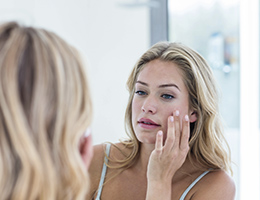
April 6, 2019—Rosacea is a chronic skin condition with no cure—at least not yet. Its signature symptom is facial redness. By some estimates, it affects some 16 million people in the U.S.
If you're living with it, you share a diagnosis with some famous people, including Bill Clinton and Diana, Princess of Wales. Here are six facts to know about this widespread disorder:
1. It often starts with a tendency to blush or flush. In time, people with rosacea may have persistently reddened skin, usually around the center of the face, including the forehead, nose, cheeks and chin. Rarely, the ears, chest and back may be affected.
2. Rosacea can cause more than redness. It can also trigger:
- Blood vessels that show through the skin.
- Bumpy, thickened skin, typically on the nose.
- Burning, stinging, itching or swelling.
- Small red bumps or pus-filled pimples that resemble acne.
For as many as half of patients, rosacea may also affect the eyes. They may look bloodshot and watery and feel irritated, as though sand were in them. Vision may also be blurred.
3. It usually develops after age 30. Fair-skinned people who blush easily have heightened risk. It appears to run in families too. And while it's more common in women, it's usually more severe in men.
4. Treatment can make your skin look and feel better. So tell your doctor if there's any chance you might have rosacea—especially since untreated rosacea can get worse.
If you do have rosacea, your doctor may advise antibiotic medicine to apply directly on your skin or to take as a pill. Your doctor may also suggest:
- Gels to help skin look less red.
- Laser surgery or other treatments to remove visible blood vessels.
- Laser surgery or other treatments to remove extra skin to help a bumpy or swollen nose look smaller.
For eye problems, your doctor may recommend steroid eye drops or other medicine.
5. Symptoms may flare and then go away for a while. But what makes rosacea worse may vary from person to person. Try writing down when your symptoms flare so you and your doctor can look for patterns. Possible triggers include:
- Heat, including hot baths.
- Exercise.
- Sunlight.
- Wind.
- Very cold temperatures.
- Hot or spicy foods and drinks.
- Alcohol.
- Menopause.
- Emotional stress.
- Long-term use of steroids on your skin.
6. Gentle skincare can help control rosacea. In the morning and at night, gently clean your face with a mild, non-abrasive cleanser. Spread it on with your fingertips—a rough washcloth might irritate your skin. Then rinse with lukewarm water and blot your face dry with a thick cotton towel. Let your face dry thoroughly before applying any topical medicine or moisturizer.
And be sure to regularly use a sunscreen with an SPF of at least 30 that protects against UVA and UVB rays.
Sources: American Academy of Dermatology; National Institutes of Health; National Rosacea Society